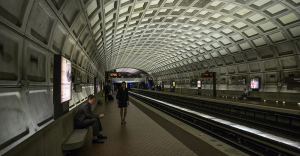
The Federal Transit Administration has supervision of the D.C. Metro as of an Oct. 9 announcement from the Department of Transportation, making the subway system the first in the country to be under federal oversight.
The D.C. Metro is the first United States subway system to be placed under direct government supervision of the Federal Transit Administration due to lapses in safety regulations, U.S. Secretary of Transportation Anthony Foxx announced Oct. 9.
Although everyday operations will continue under the Metro’s oversight, the FTA can perform unannounced facility inspections at any time.
This action was outlined in a letter from Foxx to National Transportation Safety Board Chairman Christopher Hart. The letter was issued in response to two “Urgent Safety Recommendations” from the NTSB made Sept. 30.
The recommendations were proposed as part of an ongoing investigation into an accident that occurred Jan. 12 in Metrorail’s L’Enfant Plaza, when the tunnel filled with smoke, resulting in the death of one passenger and sickness of many others.
The NTSB also recommended that the Department of Transportation seek legislative action and transfer the oversight of the Washington Metropolitan Area Transit Authority to the Federal Railroad Administration from the Tri-State Oversight Committee, which has been deemed ineffective by both the NTSB and the DOT. Instead, the DOT is handing the responsibility.
According to The Washington Post, Foxx said transferring supervision to the FRA would increase confusion and slow down improvements, as it would require congressional action.
“We take every recommendation of the NTSB seriously, including how quickly we can implement an urgent recommendation,” Foxx wrote in the letter. “In this case, we agree on the problem identified by NTSB, but believe there is a faster, more effective way to address it.”
Congressman Gerald Connolly (D-Va.) told The Washington Post, in an article published Oct. 9, that D.C. Metro safety should remain a top priority and questioned whether Metro oversight should be directed to the FTA and not the FRA.
“I look forward to learning more about Secretary Foxx’s proposal to ramp up FTA’s oversight of the Metrorail system but remain concerned that immediate, effective oversight not be victim to bureaucracy,” Connolly said. “Metro needs robust safety oversight today. And to perform that oversight we need an agency with the team and the regulatory tools to do the job today. According to the NTSB, that agency is the FRA, not the FTA.”
The measures also require that WMATA use federal funds to address certain safety deficiencies. The FTA will hold this position until D.C., Maryland and Virginia can establish a functioning State Safety Oversight Agency to replace the TOC.
Additionally, the FTA has already conducted a “Safety Management Inspection” and issued a safety directive consisting of a series of required corrective measures.
WMATA is also required to hire a general manager immediately, as it has been without permanent leadership since the retirement of Richard Sarles in January.
“[The manager must be] able to correct the course at the transit agency and aggressively manage the implementation of the Corrective Action Plan, which has been approved by the FTA,” Foxx wrote. “The urgency of having accountable leadership at the helm of WMATA cannot be overstated.”
According to The Washington Post, Metro’s interim general manager Jack Requa welcomes Foxx’s action.
“We will continue to work closely with the FTA to improve safety of the WMTA system and are fully engaged in implementing corrective actions recently approved by the agency,” Requa said. “We appreciate Secretary Foxx’s continued support and his leadership on safety oversight.”
Bridget McElroy (COL ’18) uses the Metro at least twice per week to commute to her internship, and spoke to its unreliability and need for increased safety regulation.
“I don’t think that the Metro is safe at all,” McElroy said. “A lot of the time it just stops at a station or in the middle of a tunnel and doesn’t tell you what’s going on, which is confusing and dangerous. It is also scary because they never tell you how long the train will be stopped for. The speakers never work and a lot of the time you can’t hear the conductors.”




















